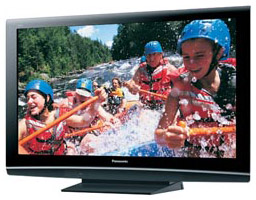Earlier this year I purchased a 42-inch plasma with an HD tuner. With this I was able to receive HD broadcasts for stations available on the "basic extended" tier from my cable provider. When my cable provider recently re-priced their services and offered a "digital starter" plan for the same monthly rate as my current service, I switched to their digital offer because certain programs that previously were available on my current tier were moved to the low-end digital tier.
Since the digital converter was installed for my new digital starter service, I no longer am able to receive the HD broadcasts from stations that are available on the digital starter tier. When I asked the cable provider about this, they said I would need an HD converter to receive those broadcasts rather than "free" digital converter they provided with my new service. Of course, the cable provider gladly will replace my free digital converter for an HD converter... for an additional $6.50 monthly rental fee.
My question is: Can HD converters or tuners be purchased at retail stores that are compatible with and can be used instead of renting the HD converters the cable company wants to provide? If so, what recommendations, and pros and cons, can you make for the case to purchase a non-cable company specific HD converter versus renting the cable company specific HD converter?
Thanks for your advice!
-Garry B.
Answer:
Hello, Garry,
I assume you have already tried plugging your TV into the raw cable feed to see what channels you can still receive, yes? You may still be able to get some of your cable channels in HD, including the local networks, though the channel numbers may not match up with what you see on the cable box, and certain channels that you are entitled to in your package may be scrambled or otherwise unavailable.
To answer to your question, cable providers are, by law, supposed to support the ownership of external set-top box hardware by the customer but in reality their support for this type of hardware is limited at best. Most cable companies don't give you the option to purchase your own box, and you normally cannot buy cable boxes in stores and get them to work with your local cable service either. Also, be very wary of buying used cable boxes on eBay as these are frequently stolen or "non-returned" cable boxes that are bound to a specific cable service and will most likely not work with your own local provider.
But WAIT! All hope is not lost! The CableCARD standard was introduced to help faciliate the use of customer-owned cable tuners and DVRs. A CableCARD is a simple card that you get from your local cable company which is programmed for your account. The card is then inserted into your own cable box in order for you to receive your channels. But CableCARD has some limitations: it doesn't support video-on-demand nor PPV (Pay Per View) because it is a one-way (receive only) format. CableCARD-based boxes also typically have only limited access to the program guide. For these reasons, as well as half-hearted support by most cable operators, CableCARD has never really caught on. However, it is still possible to purchase CableCARD-based HD cable boxes and HD DVRs that will work with most local cable providers. Just be prepared to put in a little effort to get the CableCARD activated and working with your account (and be prepared to wait on hold with your local cable company... for a very long time).

Also, a web site called "hddvrtv.com" sells CableCARD-based DVRs at low prices (most are used or refurbished boxes) which can also be used with most cable providers. We haven't used any of their boxes directly, so your mileage may vary, but it's worth exploring to see if they have a unit which serves your needs. Whether you go this route, or the TiVo route, you will need to get a CableCARD directly from your local cable company and you will have to pay a monthly fee for the card. But the rental fee for the card is typically much lower than the rental fee for a DVR or cable box.
The reality is, if you cannot tune in the channels you want via your TV's built-in TV tuner, and you don't want to pay the monthly TiVo fee or mess around with the idiosyncracies of a CableCARD device, then your only real options are to lease the HD cable box or digital set-top box from your cable service, or dump cable entirely and put an antenna on your roof to get your HDTV channels for free.
UPDATE: Another option that came out recently is Sling TV. With Sling TV, you get a nice assortment of Pay TV channels (including ESPN and CNN) delivered over the internet for about $20/month.
Here are a couple of articles you might find useful:
Anyway, I hope this helps.
-Chris
Note: This article was updated in Summer, 2015 with the latest information.